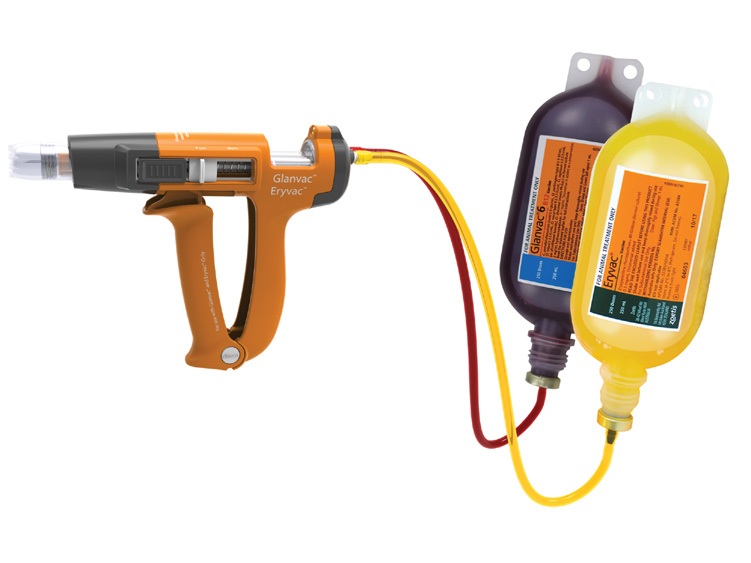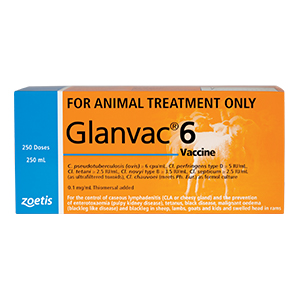Glanvac®6
Description
- Glanvac 6 provides sheep and goats with protection against Cheesy Gland (CLA) and the five main clostridial diseases (Black Disease, Black Leg, Malignant Oedema, Pulpy Kidney, and Tetanus ).
- Cheesy Gland (CLA) is a risk to all Australian sheep flocks. Clostridial diseases are found Australia wide in the soil and the environment.
- Glanvac 6 utilises Zoetis' ultra-filtration technology, this allows the vaccine to produce a more targeted immune response in sheep and goats, while providing producers with the convenience of a 1 mL dose rate.
Key Benefits
- Creates a high level of disease protection in the breeding flock.
- Improves lamb marking and weaning percentages by preventing clostridial deaths such as Pulpy Kidney and Tetanus
- Improves meat quality through Cheesy Gland protection, ensuring export and domestic customers receive a quality product.
- Improves wool quality and quantity by protecting against Cheesy Gland.
- 30-day reuse claim when label directions are followed correctly.
Recommendations for use
- Control of caseous lymphadenitis (CLA or Cheesey Gland) and the prevention of enterotoxaemia (Pulpy Kidney disease), Tetanus, Black Disease, Malignant Oedema and Blackleg in sheep, lambs, goats, and kids plus swelled head in rams.
The Zoetis Advantage
Glanvac is produced using Zoetis' Ultra Filtration technology.
This technology:
- Ensures the vaccine is of the highest quality by seeking out and removing unwanted particles
- Enables the vaccine to generate a more targeted immune response
- Delivers reliable protection within a convenient 1ml dose rate
Glanvac 6 protects against the main5 fatal clostridial diseases and Cheesy Gland (CLA).
|
Advantages Glanvac+Eryvac Dual Vaccinator
This vaccine may be administered with Eryvac vaccine (APVMA No. 53385) using a dual-barrel single needle vaccination device and has been proven a safe method of vaccination in pregnant ewes.
The co-administration of Glanvac vaccine and Eryvac vaccine using a dual-barrel single-needle vaccinator resulted in efficacy (measured using serological outcomes such as antibody titres) that was comparable to that of each vaccine administered separately, with an acceptable safety profile.
|
 |
Dosage
Dose rate: 1 mL for all classes of sheep.
Injection site: Vaccine should be administered subcutaneously using a shrouded vaccinator and a 6mm (¼ inch) 18-gauge needle on the side of the neck midway between the ear and the front of the shoulder.
Vaccinate at a 45° angle to the skin in lambs and adults with short wool, and at 90° for adults with wool growth.
Lambs need two doses:
1. First ‘priming’ dose at marking.
2. Second ‘booster’ dose at weaning.
Previously unvaccinated ewes need two doses:
1. First ‘priming’ dose at the time of joining or scanning.
2. Second ‘booster’ dose approximately 4 weeks before the expected date of lambing.
Other classes of previously unvaccinated sheep need two doses:
1. First ‘priming’ dose.
2. Second ‘booster’ dose approximately 4 weeks after.
Previously vaccinated sheep need ‘annual booster’ vaccinations:
- For ewes vaccinate 4 weeks before the expected date of lambing.
- This should pass temporary immunity to their lambs in the colostrum, or first milk, to protect them for the first 6 to 8 weeks of their lives.
- For Pulp Kidney protection where possible, give the annual booster at least 2 weeks prior to the time of maximum risk, e.g. transfer to lush pasture or grain feeding.
- For Cheesy Gland (CLA) booster doses should be given within 6 months prior to shearing
GOAT
Dose rate: 1mL for all classes of goats.
Injection site: Vaccine should be administered subcutaneously using a shrouded vaccinator and a 6mm (¼ inch) 18-gauge needle on the side of the neck midway between the ear and the front of the shoulder. Vaccinate at a 45° angle to the skin
Kids need two doses:
1. First ‘priming’ dose at marking.
2. Second ‘booster’ dose 4 weeks later.
Pregnant does:
Previously unvaccinated does need two doses:
1. First ‘priming’ dose at the time of joining/mating.
2. Second ‘booster’ dose approximately 4 weeks before the expected date of kidding.
Previously vaccinated does:
- Vaccinate 4 weeks before the expected date of kidding.
- This should pass temporary immunity to their kids in the colostrum, or first milk, to protect them for the first 6 to 8 weeks of their lives.
Other classes of previously unvaccinated goats need two doses.
1. First ‘priming’ dose.
2. Second ‘booster’ dose approximately 4 weeks after.
GOATS WILL THEN REQUIRE REGULAR REVACCINATION AT 6 MONTHLY INTERVALS TO MAINTAIN EFFECTIVE IMMUNITY AGAINST ENTEROTOXAEMIA (PULPY KIDNEY)
Glanvac can be stored and used for up to 30 days after first opening if the following steps are taken:
1. Unscrew the delivery tube from the vaccine pack
2. Empty the delivery tube and vaccinator by depressing the plunger several times
3. Disinfect the stopper with Methylated spirits
4. Store the vaccine in this original cardboard carton and place in the refrigerator (2oC – 8oC). DO NOT FREEZE
5. Use the remaining vaccine within 30 days
6. Clean the delivery tube and draw off cap and sterilise by boiling in water for 10 minutes
7. Before reuse disinfect the stopper with Methylated spirits
Applicator Recommendations
- Use a vacinator with a retractable shroud to tent the kisn and for single handed vaccination.
- Clean and maintain the vaccinator as outlined by the manufacturer daily.
- Only use methylated spirits at the site of vaccination or to clean the needle while in use.
- Ensure the needle is sharp and not burred, replace often.
- DO NOT leave vaccine in the draw off tube or vaccinator after the workday
PACK SIZES
Plastic Packs: 100mL, 250 mL,500 mL.Storage
Protect from Light
DO NOT leave vaccine in the draw off tube or vaccinator after the work day
Additional Information
Take care to avoid accidental self-injection.
Allow the wound to bleed freely and do not squeeze or interfere with the injection site to avoid spread of the vaccine. Clean the wound thoroughly with soap and water, and then keep it clean and dry.
In the event of self-injection, seek medical attention if you are concerned and show the package leaflet or the label, to the Medical Practitioner.
If pain persists after medical examination, seek medical advice again.





 A Better Way To Buy
A Better Way To Buy